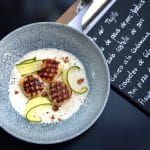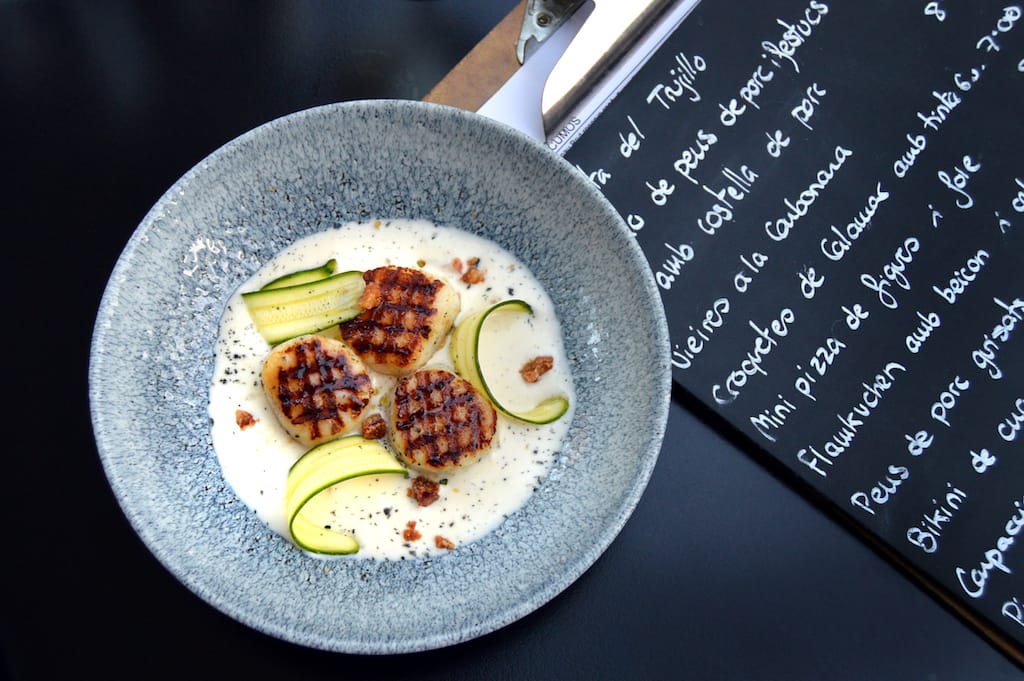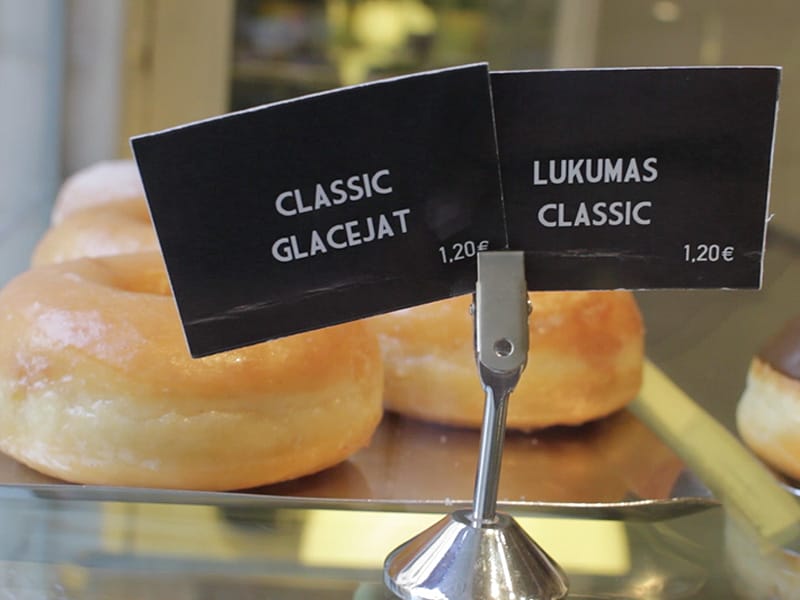At Pollería Fontana, a cozy restaurant inspired by the owner’s history in a poultry shop, it’s neither chicken nor eggs, but rather family that comes first.
The name, which means Fontana’s Poultry Shop, is a tribute to the owner’s family business, a store selling chickens and eggs that was established by chef Nil Ros’ grandparents in 1935. But for the last six years, Pollería Fontana has been a contemporary, lovely little restaurant with an idiosyncratic personality in Gràcia, a fittingly idiosyncratic neighborhood that hosts Barcelona’s highest concentration of small independent restaurants.

With old kitchenware and trinkets strewn about, numerous family photos in black and white hanging and a casual but warm atmosphere perfect for small groups and families, the space is like a contemporary tribute to the Catalan culinary neighborhood tradition.
The old and original Pollería Fontana was, in fact, a witness to the most important conflicts of the 20th century in Barcelona – as far back as the Spanish Civil War (1936-1939). During this tumultuous time, the pollería was also a safe place for Nil’s grandfather and his grandfather’s brother-in-law, men of peace who created a hideout from the draft. As Nil explains, “They separated the ice bar’s fridge from the wall to make a hole to access the space in between the wall and the back of the building’s stairs. My grandfather and his brother-in-law lived for three years there, in a space of maximum three meters squared. They only went out at night, and hardly put their foot on the street.”
The original poultry shop was managed by Nil’s aunt until 1997. It was near the Fontana metro station in Gràcia, less than 10 minutes from the current location of the modern restaurant, which opened in 2013. During the 80s and 90s, this pollería was part of Nil’s childhood and the soul of that business is constantly present in his restaurant. It’s in the old pictures and nostalgic items, but most of all it’s in the restaurant’s custom of having the best chicken and organic eggs at hand.

Nil started as a chef some 22 years ago. Though he initially wanted to be a journalist, he took the plunge into the culinary world and joined a hospitality school. Among the series of restaurants he worked at – including the great Coure on Passatge Marimon – one was particularly important and inspiring for his career: Hostal Cal Jaumet in Torá, a small village in Lleida province. It was managed by the 86-year-old l’avia (grandma) or la padrina (godmother) Ramona Closa, famous in Catalonia for her partridge à la vinaigrette. Alongside l’avia Ramona, Nil was working on all kinds of traditional old-school Catalan recipes. “We were cooking the famous xup xup cuisine like you would in the 30s or 50s. She was amazing, someone who, with just an onion, tomato and garlic, could make real wonders.” (Xup xup is a Catalan word for the sound of bubbling stew, making “traditional stew cooking” a loose translation for cuina de xup xup.)
At Pollería Fontana, everything – not just the food –is infused with meaning. There’s a legacy to enjoy in every bite and to look at on the walls.
About 95 percent of the Pollería Fontana’s products – many of them organic – come from local farms. The restaurant’s cooking is rooted in the Catalan tradition, with minimum contemporary techniques and touches. The low-heat slow cooking of little plates to share makes the restaurant a perfect fit for both a tapas supper with a beer or a more complete casual dinner with a bottle of wine.
A light supper might just have you dining on one of the best Spanish potato omelets in the area, a wonderful Russian salad, Nil’s grandmother’s recipe of cod fritters or wonderfully grilled squid – plus other seasonal dishes that will only be revealed in their time. No doubt, the most iconic tapa is their addictive roasted chicken croquets with a touch of Iberian ham. The croquets arouse deep childhood feelings in locals, like the memory of a crowd of fútbol fans celebrating after winning La Liga. Traditionally – croquets are a dish made of leftovers. But in this case, Nil uses the whole chicken, with all the best parts perfectly roasted.

Even if the menu labels everything as tapas, we find on this list more popular dishes to fill our stomachs properly with rustic satisfaction, including the seasonal rice dishes –right now it’s seafood or “mountain” rice. The latter is made with Iberian pork rib, local artichokes from El Prat and horn of plenty mushrooms. Each ingredient is clearly expressive and the Bomba rice from the Delta de l’Ebre is perfectly cooked. Just one bit of advice, order a few tapas with a drink first since the rice needs time to cook and rest – it’s made to order.
The octopus is first cooked for 20 minutes in the Galician style (scared, or dipped in boiling water, three times to scald it, then boiled in a big pot until al dente). It rests 10 minutes, and then is grilled for another 20 to caramelize the exterior and create a crusty texture for contrast. It’s served with potatoes and a nutty romesco sauce, mixing beautifully the cooking tradition of both sides of the peninsula. Other must-trys of Catalan traditions are also on the menu, like the fricandó, a stew of beef filets with St. George’s mushrooms, and the ox-tail stew or callos (tripe stew).
“This is my philosophy,” says Nil. “All items on the menu should have something special to offer.” In fact, at Pollería Fontana, everything – not just the food –is infused with meaning. There’s a legacy to enjoy in every bite and to look at on the walls. Over the counter, separating the kitchen from the dining room, a photo of Ramona looks out from the window of its black, rectangular frame, a protector god. From there, she observes how Nil is expanding her traditions and that of his family at Pollería Fontana.
Published on July 16, 2019
Related stories
January 17, 2020
BarcelonaA former village annexed to Barcelona in 1897, the city’s Sant Andreu district was a center of industrial development throughout the 20th century, becoming home to a large population of factory workers. Today, it is a quiet residential area that feels caught between its Catalan village roots and industrial past, with buildings being renovated and…
February 26, 2015
BarcelonaHere we are in the Bishop’s Belly, La Panxa del Bisbe, which is not the midsection of a Catalan priest, but both a restaurant and a mountain. The latter is one of the peaks of the sacred Catalan mountain of Montserrat, so-called because its shape evokes a small head over a rotund, pronounced belly. It’s…
December 27, 2012
Barcelona | By Johanna Bailey
BarcelonaEditor’s note: This is the penultimate installment of “Best Bites of 2012,” a roundup of our top culinary experiences over the last year. Stay tuned for our final “Best Bites” dispatch, from Istanbul, tomorrow. Restaurant Roma We hadn’t planned on bringing in La Nochevieja at Restaurant Roma, but it was nearby and we didn’t feel…




















































































